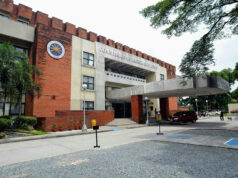CONFLICTS of interest often go unremarked. A partial list of these social anomalies will suffice.
A food blogger works as a PR consultant of a restaurant she praises to high heavens in her social postings, promoting her comments as third party reviews. A legislator incentivized by vested interests launches an investigation (in aid of legislation) of the sponsors’ competition, explaining the initiative as a social media issue. An art collector, who has an inventory of the works of a particular artist, hypes up the artist’s work in an art forum without disclosing his collection.
Robert Hughes, once the long-time art critic of TIME, made sure not to own any paintings or art works at all, keeping his walls at home bare. He would never be accused of reviewing artists he owned or pressuring with bad reviews those he wanted to acquire.
Hughes even downplayed the importance of his job as an influencer of tastes and trends, when he said: “One gets tired of the role critics are supposed to have in this culture. It’s like being the piano player in a whorehouse; you don’t have any control over the action going on upstairs.”
Isn’t the recent scandal in health insurance a case of being on both sides of a transaction? These included releasing money for fictitious hospitalizations of 130-year-old patients and paying for non-existent treatments in dialysis clinics. Guess whose bank accounts those funds ended up in?
Behavioral economists have a concept of “asymmetry of information.” Here, one party in a transaction has more knowledge than the other. In the sale of a used car, the seller has more information than the buyer on how good (or bad) the product is. Is the price fair? The buyer is at a disadvantage in determining whether the car is a bargain or a lemon. Only the engagement of a car mechanic, at an extra cost to the buyer, can correct this asymmetry of information.
The filing of the statement of assets, liabilities, and net worth (SALN) is not just to establish how rich (or poor) a political leader or government appointee is before and after his election or appointment. It also serves to disclose assets and existing corporate ties, say to a security agency or a dialysis clinic… in case the names come up in a bidding process. And the winner is… guess who?
Prior disclosures for board directors of private companies, especially those listed in the stock exchange, are intended to identify connections with other companies as well as relatives to the fourth degree. This ensures that any dealings with the company do not involve “related parties” in a conflict of interest.
Even in medical diagnosis, a doctor’s eagerness to replace your knees (you will be in a wheelchair in six months if you don’t) may be viewed by the patient as an expensive and painful option driven by a doctor’s profit motive. Is this why a second opinion is sought? The second doctor is likely to ask — who’s proposing the knee replacement?
Does an innate suspicion of motives and vested interests smack of cynicism? Aren’t some who claim to be disinterested third parties (I’m just giving you my honest opinion) truly free of any hidden interest?
There is of course the possibility of “shared interest” where two parties (shareholders and employees) both benefit from a particular development, say the rise in revenues and profits of the company they work for, a rare win-win option.
Conflict of interest arises when one party has a hidden advantage over another. Disclosure of a possible conflict is helpful. (I own this artwork that I am hyping to you so I can get a better price).
The admonition to stay home and not go to the mall, even with a face mask, only to window-shop (there’s a long line outside the sneaker store with a big “sale” sign) and then snack in a socially distanced dine-in coffee shop, can be well-intentioned. But even this is not always heeded.
Who really needs a new pair of sneakers when one is mostly working from home? Well, the economy needs a lift… and so do you. Where’s the conflict of interest there?
Tony Samson is Chairman and CEO, TOUCH xda



